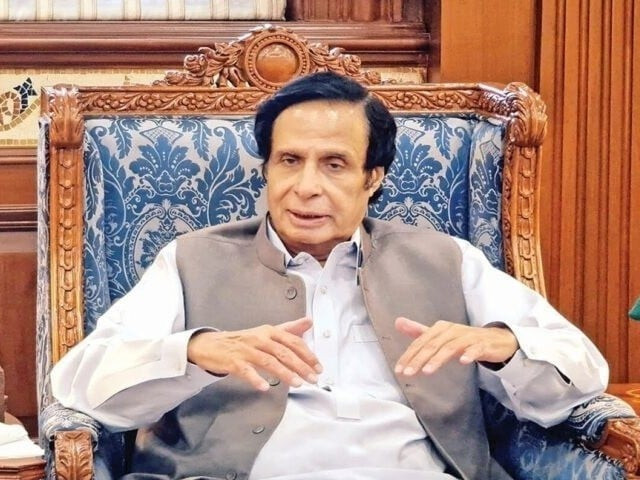Punjab governor withdraws order to de-notify CM
Rehman confirms to LHC that Elahi won vote of confidence

Governor Balighur Rehman on Thursday withdrew his order to de-notify Punjab Chief Minister Parvez Elahi and his cabinet after confirming to a Lahore High Court’s larger bench that the PML-Q stalwart had won a vote of confidence held in the provincial assembly in the wee hours of the day.
A five-judge bench of the LHC, headed by Justice Abid Aziz Sheikh, later disposed of the CM's plea.
Justice Sheikh congratulated all the parties involved in the case, noting that it was a good omen that a political issue was resolved at a political platform – the Punjab Assembly.
He added that the unnecessary involvement of the courts in such political issues actually did not seem appropriate.
Also read: Sana claims Elahi 'not eligible' to call for vote of confidence
As the proceedings commenced, petitioner Elahi’s counsel Barrister Ali Zafar told the court that his client had taken a vote of confidence securing 186 votes.
Attorney General for Pakisan (AGP) Mansoor Usman Awan opposed his stance, arguing that “no due process” was adopted while taking the vote of confidence.
During the arguments, the judges noted that while Elahi had challenged the governor’s order terming it illegal, he had also obtained a vote of confidence in compliance with it.
They raised the question that under such a situation, what would be the constitutional status of this vote of confidence if the court set aside the governor’s order.
Barrister Zafar argued that the court had not barred them from doing so.
To this, Justice Asim Hafeez remarked that the vote of confidence was not taken to satisfy the court but under Sub-section 7 of Article 130 of the Constitution.
Justice Sheikh remarked that if both parties were in agreement, the bench would set aside the governor’s order of de-notifying CM Elahi and his cabinet.
Also read: Sanaullah warns PTI of imposing governor’s rule in Punjab
He added that the governor’s second order was also implemented by testing the floor of the House.
The AGP replied that there was no need for the party’s agreement, adding that the court could pass an order.
Later the arguments revolved around different queries including how the satisfaction of the governor would be judged if he relied upon reasons that the CM did not command the confidence of the majority of the members of the provincial assembly.
There were other questions raised as well -- how much time was considered sufficient if the governor issued orders for taking a vote of confidence and whether or not he could fix the time for it.
On the argument by Balighur Rehman’s counsel that his client’s powers could not be intervened, Justice Hafeez remarked that the question arose whether or not the governor could pass an order every week requiring the chief minister to take a vote of confidence.
“If yes, then describe what its consequence will be?” he added.
Justice Abid Aziz inquired how could it be determined that the reasons upon which the governor had directed the CM to take a vote of confidence were satisfactory.
Barrister Zafar replied that there must be reasonable reasons but not like those relied upon by the governor in this case.
He further argued that the governor could only summon the House, adding that as far as the fixing of date and time to take a vote of confidence was concerned, it was purely the job of the Punjab Assembly speaker.
After half an hour break, the court resumed proceedings but this time the AGP sought time for taking instructions from his client – the Punjab governor. The court admitting the request again adjourned the proceedings for half an hour.
After the second break, the AGP told the court that the governor had received a report from the speaker, confirming that the chief minister had succeeded in taking a vote of confidence in terms of clause (7) of the Article 130 of the Constitution while complying with the order passed by him on December 19, 2022.
As a consequence of compliance, the governor was withdrawing the order he had passed on December 22, 2022 wherein the petitioner had ceased to hold the office of the chief minister and his cabinet was also dissolved.
Also read: Sanaullah warns PTI of imposing governor’s rule in Punjab
Consequently, the LHC set aside the notification issued by the Punjab chief secretary on December 22, 2022.
In his plea, CM Elahi had challenged the orders issued by the Punjab governor on December 19 and 22, 2022 whereby while exercising powers under Article 130(7) of the Constitution, a session of the provincial assembly was summoned and the petitioner was required to take a vote of confidence. However, the former order was not effectuated in view of the ruling order passed by the respondent, the speaker of the Punjab Assembly, on December 20, 2022.
Eventually, through the impugned order of December 22, 2022, while exercising the powers under Article 130(7) of the Constitution read with Rule 22(7) of the Rules of Procedure of the Provincial Assembly of the Punjab, 1997 (Rules), it was held that petitioner had ceased to hold the office of the chief minister and the cabinet was also dissolved.



















COMMENTS
Comments are moderated and generally will be posted if they are on-topic and not abusive.
For more information, please see our Comments FAQ